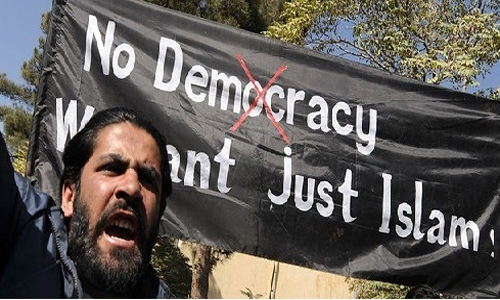Afghanistan has experienced many political systems including democracy, Kingdoms, Talibanism, autocracy and so on but none succeeded to change the destiny of Afghan people. Among these the new democratic system was exceptionally welcomed by most Afghan people hoping to end the long destructive conflicts and social disorders in the country. Afghan citizens eagerly wanted move towards peace, prosperity and an efficient democratic system, but now after nearly two decades of hopes and optimism everyone is disappointed about its functionality as well. In fact, people are not only hopeless but extremely abhorrent and tired of long-term war and imposed conflicts. People expected to reach some of their dreams thorough implementation of democratic values, it also thought to be vacuous.
Undoubtedly democracy is the most important factor in stabilization and development of post-conflict countries, but it has not produced a good result in Afghanistan. Questions are raised whether the soil of Afghanistan is conducive to the tree of democracy or it has not planted properly? What are the differences between Afghan democracy and other democracy in the world, especially the democracy of post-conflict countries which has produced wonderful results? Whatever is the difference is the current system could not rescue Afghanistan; if the current system were successful, the two decades time was not a short period. Therefore, it is logical to doubt about function or dysfunction of this system in the context of Afghanistan.
According to political analysts, there is nothing wrong with democracy on condition that we factually apply it on the country. The main feature of democratic system is gain of power through transparent elections, but this has not happened in Afghanistan. Other feature of democracy is meaningful role of people, especially political party in sharing power but it did not happen as it experienced in other countries. In addition, meritocracy, free and positive competition is of the important feature of democracy but we stuck in our own ethnical affiliations. In fact, we never tried democracy only showed some democratic act with imposing our own childish emotion. As a result, it is obvious that we cannot collect the harvest of what we never truly cultivated.
As pointed out, one of the main factors which failed democracy in Afghanistan is the absence of true political party. The relation between democracy and political party is likened to two wings of a bird or termed as backbone of democracy. No bird can fly without two wings and no democracy can succeed without active political parties. Therefore, democracy is meaningless without meaningful and positive completion of political parties in productions of effective plan and theories. Even in developed Western countries, if people are left on their own without political parties and powerful civil society then political anomalies and inefficiencies of state institutions will quickly emerge.
However, Afghanistan has more than 50 officially registered political parties and numerous movements occupying its political landscape, but political parties must be defined on the basis of modern criteria, the ethnic leaders cannot take the place of parties because they follow a certain ideology that defines their own political, economic, and cultural interests. In Afghanistan, the lack of active political parties and civil society has ensured the survival of ethnic leaders as voting bank. On the other hand, holding elections in the absence of political parties powerful and dynamic civil society changed to an on the spot deal between the political elites and people.
Political parties are supposed to be domestic agents that shape and reflect the political will of people but in Afghanistan due to lack of principle based political parties, they only paved the way for the ethnic leaders to use the ethnicity as a tool of following their personal interests. In order to consolidate a modern political party on the basis of democratic criteria, it is necessary to hold internal election and develop an appropriate political culture raising the general awareness of society members and improving the economic situation so that people may not be compelled to sell their political destiny versus little money. Meanwhile, there is need for an ethical and political commitment of the people with the fate of their society. People are repeatedly dissatisfied from political leaders, but during the election campaign they are easily deceived and forget about the past; in this way the past is frequently repeated.
Some political parties with leadership of the ethnic leaders try to invent enemy so as to continue their games. In order to strengthen their political weight, they try to introduce other tribes as a common enemy to their respective tribe and this way they can define their political position by raising people’s sentiments. It can be said that ethnic the leaders and voting banks are some of obstacles to institutionalization of democracy in the country. Political parties and powerful civil society will emerge when the level of political consciousness and awareness of the people rise, and this will only be achieved through the inclusive education and media awareness
Moreover, democracy defined as rule of people on people but in Afghanistan people are not truly present in political arena. In fact, people neither are aware of their role and nor believe in their role in forming governmental system and political decision making process. Because of poverty and engagement with basic requirements it does not seem to find chance to think about their secondary needs as participation in political process. Conversely, economic growth causes social classifications motivating them to contribute in political process for their own interests. In last elections, there been hundreds of cases who voted for the sake of money. Therefore, democracy will not grow in Afghanistan unless truly prepare the bed for its materialization.
Home » Opinion » Challenges of Democratization in Afghanistan
Challenges of Democratization in Afghanistan
| Mohammad Zahir Akbari

